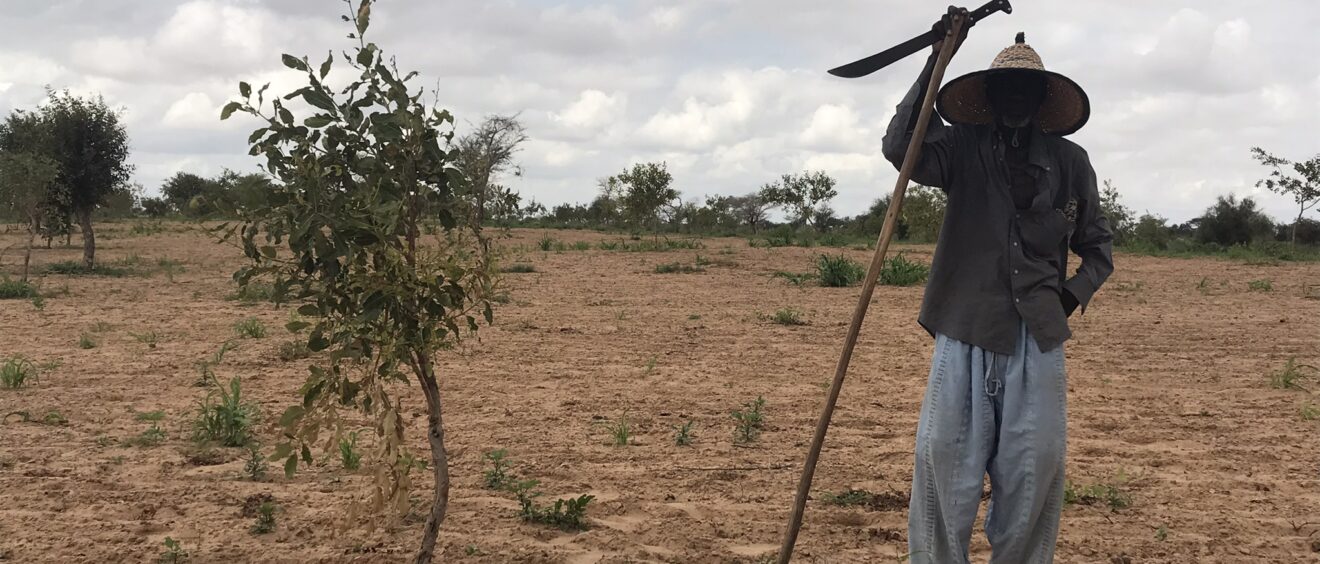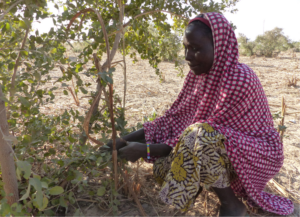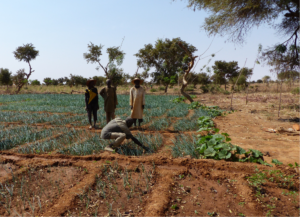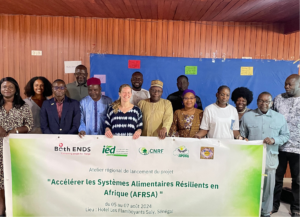
Regreening the Sahel through FMNR – more than just a land use practice
When you look at a patch of dry and dusty ground in the hot, semi-arid Sahel, it may be hard to imagine that a rich ecosystem is hidden beneath your feet. Fortunately, in hundreds of communities in Niger, Burkina Faso and Senegal, more and more people are well aware that the roots of a greener future lie under the earth.
Since 2018, Both ENDS has cooperated with partners – including Centre Régional d’Enseignement Spécialisé en Agriculture (CRESA, Niger), Secrétariat Permanent des ONG (SPONG, Burking Faso), and Innovation, Environnement, Développement Afrique (IED Afrique, Senegal) – to support local communities in regreening the Sahel. Thanks to the programme, more than 65,000 farmers are now practicing Farmer Managed Natural Regeneration (FMNR) to facilitate regrowth of trees and shrubs.
LOCALLY-LED APPROACH
In the Sahel’s arid environment, where access to water is limited, FMNR provides an accessible, affordable, and, most importantly, sustainable approach to ecosystem restoration. By nurturing the region’s ‘underground forests’ of roots, stumps and seeds, farmers have successfully regreened nearly 140,000 hectares of land in the Sahel. In addition to enhancing soil fertility and water retention, farmers have increased their incomes, strengthened their resilience to climate change, and improved social cohesion in their communities.
The success of the programme – which has taken place in a context of persistent instability, conflict and violence – is due to the locally-led approach. More than 800 village committees, which include representatives of different groups within the communities, have been established to manage the continued regreening efforts. The programme facilitates training and technical support, but it is local farmers who are driving the change. In 2024 alone, nearly 15,000 farmers were trained in FMNR.
Since the beginning of the programme, nearly 90,000 farmers have learned about FMNR. Across the three countries, FMNR ‘champion’ farmers are now inspiring others in their communities to adopt FMNR by letting them see for themselves that the approach works. On regreened FMNR plots, champion farmers are training others in FMNR techniques, such as pruning and the creation of micro-basins around saplings. Since the roots of the programme are local – both literally and figuratively – the regreening continues even when villages become inaccessible to local partners due to the security situation.
AN ENABLING ENVIRONMENT
A key part of the Communities Regreen the Sahel programme is to create an enabling environment for FMNR – to promote awareness and broader support, including through policies, economic incentives and funding for Farmer Managed Natural Regeneration at all levels, from the local to the global. The village committees, which often include local leaders from both farming and pastoralist communities, serve as an important space to discuss and further promote FMNR, as well as to make agreements about land use and resolve potential conflicts, such as those between farmers and nomadic pastoralists. Both communities – whose different uses of land can lead to conflict – have much to gain from regreening, as well as from clearer arrangements around land use.
In order to create an economic incentive to accelerate the adoption and sustainability of FMNR by farmers, the Communities Regreen the Sahel programme also supports local women’s groups, union and federations in the processing and sale of FMNR foods (e.g. fruits, nuts, and leafy vegetables, as well as non-timber forest products, such as shea butter, oil and honey).
At the municipal level, meetings with policymakers have yielded success. In 2024, for example, partners in Senegal secured mayoral commitments to integrate FMNR funding into municipal development plans. Significant results were also achieved at the national level. In 2024, the government of Senegal revised its Agro-Sylvo-Pastoral Orientation Law, formally recognising FMNR as a key approach to improving productivity and resilience. Senegal’s official recognition of FMNR helps pave the way for its broader adoption across the country. (The decision follows the example of Niger, which in 2020 became one of the first countries to formally promote FMNR through a presidential decree).
Both ENDS is working with partners in the Sahel to ensure that FMNR receives the attention and support it deserves among international audiences. In 2024, we participated in key conferences, including the International Conference on Community-Based Adaptation to Climate Change, hosted by the International Institute for Environment and Development (IIED) and held in Tanzania, and the Accelerating Nature Based Solutions Conference, organised by the Global Evergreening Alliance in Zambia. At the latter event, we organised a well-attended side event on the Communities Regreen the Sahel programme, which resulted in valuable new connections with other actors in the field.
We also attended the United Nations Convention to Combat Desertification (UNCCD) COP16 in Saudi Arabia and the UN Climate Conference (UNFCCC) COP29 in Azerbaijan, where we organised and participated in various side events to showcase FMNR as an integrated solution to land degradation, food insecurity and climate change. At a Board Meeting of the Green Climate Fund (GCF) in Rwanda, we engaged with key decision-makers to advocate for increased access to GCF funding for civil society organisations and for locally-driven action on climate change. Our awareness-raising and advocacy in these global policymaking spaces in 2024 attracted the attention of key actors, including bilateral donors and government officials from Burkina Faso and Senegal, who attended the side-events.
NEW PARTNERSHIPS, NEW DIRECTIONS
Meanwhile, thanks to our proven track record and clear impact, Both ENDS, CRESA, SPONG, and IED Afrique have succeeded in attracting new sources of funding to build on the solid foundations of the Communities Regreen the Sahel programme. With technical support from Both ENDS, SPONG took the lead on a proposal with CRESA and IED Afrique aimed at strengthening land tenure security with respect to restoration efforts. The project, which takes up lessons learned from the existing programme, was awarded funding from Reversing Environmental Degradation in Africa and Asia (REDAA), a programme funded by UK International Development from the Foreign, Commonwealth and Development Office.
And in July, Both ENDS and the Sahel partners were thrilled to launch an exciting new three-year partnership with the Netherlands Enterprise Agency (RVO) aimed at fostering resilient food systems in the Sahel. The new programme, which capitalises on the social and environmental results of the Communities Regreen the Sahel programme, focuses on improving livelihoods and nutrition, and massively upscaling FMNR through better legislation, policies and budgets. A key aspect of the new programme is support for small-scale women food producers to establish and strengthen value chains for FMNR foods and non-timber forest products.
Thanks to the resounding success of the Communities Regreen the Sahel programme, and the widespread adoption of FMNR in Niger, Burkina Faso and Senegal, communities across the region are now poised to turn the tide on under-nourishment and ecosystem degradation. Greener pastures are already growing.

Pruning and protecting young trees is one of the technical aspects of FMNR; yet the practice contains much more

Through FMNR, farmers have increased their incomes, strengthened their resilience to climate change, and improved social cohesion in their communities

In July, Both ENDS and the Sahel partners were thrilled to launch an exciting new three-year partnership with the Netherlands Enterprise Agency (RVO) aimed at fostering resilient food systems
